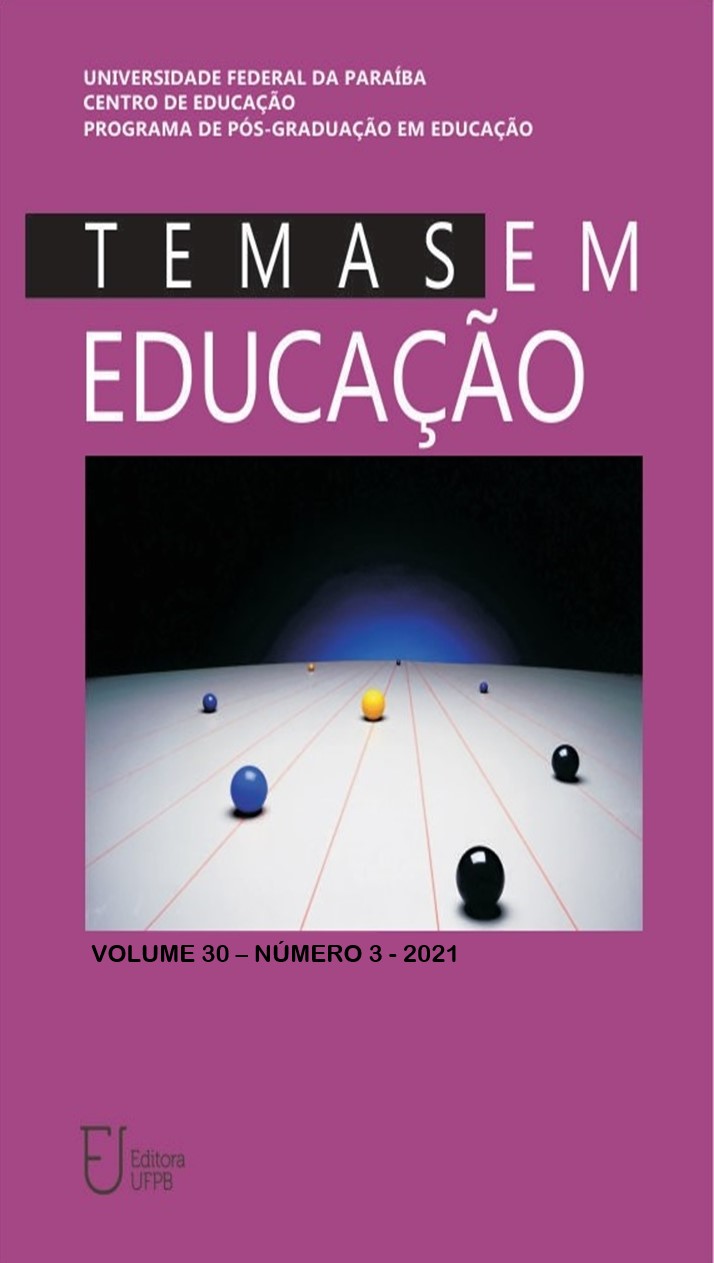Moradia e aprendizagem remota durante a pandemia de COVID-19 no Rio de Janeiro
DOI:
https://doi.org/10.22478/ufpb.2359-7003.2021v30n3.55971Keywords:
Census of Learning Conditions; Home; Remote Education.Abstract
With the pandemic of the corona virus at the beginning of the year 2020, the different scale of power that manage public education suspended the face-to-face classes to attend to measures of social isolation. In the state public school system in Rio de Janeiro, measures were taken without any type of debate or planning to transfer classroom teaching to distance learning. The hiring of an online platform service went very quickly without paying attention to the conditions of students and teachers for its use. Through constant declarations on the part of the management teams or even reports that there would be a possibility of cutting wages, many teachers started to adopt the system, even though they did not have mastery over technologies and neither was certain that the accesses would be worth as school days. The low adhesion of students to the system, generated the need to understand under what conditions they studied, even having access to the internet. This research evaluates the results of the application of a micro census on the conditions of learning in distance learning, emphasizing the situation of home in a state public school in the neighborhood of Caju in Rio de Janeiro. The results demonstrate that the mere access to the internet, which is no longer for everyone, is not sufficient for the effectiveness of the teaching-learning process at this time.
Downloads
References
ANDRADE, M. I. T. Direito de Propriedade e Renda Pessoal: um estudo de caso das comunidades do Caju. 108f. Dissertação (Mestrado em Economia). Programa de Pós-graduação em Economia da Universidade Federal do Rio de Janeiro, Rio de Janeiro, 2004.
ALMEIDA, B. O. e ALVES, L. R. G. Lives, educação e covid-19: estratégias de interação na pandemia. Interfaces Científicas, v. 10, n. 1, 2020.
BARBOSA, O. L. e CUNHA, P. G. M. Pandemia e a precarização do direito ao acesso à educação. Revista Pet Economia UFES. v. 1, 2020.
BRANDÃO, C. R. O que é o método Paulo Freire. 14ª Edição. - Brasília: Editora Brasiliense, 1988.
BRASIL. Lei de Diretrizes e Bases da Educação Nacional. Lei 9.394 de 20 de Dezembro de 1996.
DIONÍZIO, T. P. e PAIVA, L. C. Estratégias didáticas para o avanço dos processos de ensino e de aprendizagem durante a Pandemia da COVID-19. Research, Society and Development, v. 10, n:2, 2021.
DUTRA, J. L. C.; CARVALHO, N. C. C.; SARAIVA, T. A. R. Os efeitos da pandemia de Covid-19 na saúde mental das crianças. Pedagogia em Ação, Belo Horizonte, v. 13, n: 1, 2020.
FERREIRA, M. C. Ambiente de aprendizagem online ou Aprendizagem online do ambiente: contribuições da ergonomia na gestão de sistemas educacionais à distância. Engopublic UnB. Brasília, 2000.
FREIRE, P. Pedagogia da Autonomia: saberes necessários à prática educativa. São Paulo: Paz e Terra. 1996.
GEIGER, P. P.; ARUEIRA, L. P.; ALEM, A. Mapa Social da Cidade do Rio de Janeiro. IPP/Prefeitura da Cidade do Rio de Janeiro, 2001.
KOHARA, L. T. Relações entre as condições de moradia e o desempenho escolar: estudo com crianças residentes em cortiços. 297f. Tese (Doutorado em Arquitetura e Urbanismo). Faculdade de Arquitetura da Universidade de São Paulo, São Paulo – SP, 2008.
NACIF, C. L.; KOATZ, G. D.; MACHADO, M. S.; ALVES, E. B. Territorialidades e conflitos em bairros cariocas: Caju e Jardim Botânico. Anais do 12º Encontro de Geógrafos da América Latina. Montevideu, 2009.
PRETTO, N. De L.; BONILLA, M. H. S.; SENA; I. P. F. de S. (Orgs). Educação em tempos de pandemia: reflexões sobre as implicações do isolamento físico imposto pela COVID-19. Salvador: Edição do autor, 2020.
RAMOS, F. P. Injustiça Ambiental: um estudo de caso do bairro do Caju, Zona Portuária do Rio de Janeiro. 146f. Dissertação (Mestrado Profissional em Bens Culturais e Projetos Sociais). Programa de Pós-graduação em História, Política e Bens Culturais da Fundação Getúlio Vargas, Rio de Janeiro, 2014.
ROSÁRIO, P.; MOURÃO, R.; SOARES, S.; CHALETA, E.; GRÁCIO, L.; SIMÕES, F.; NUÑES, J. C.; GONZALES-PIENDA, J. A. Trabalho de casa, tarefas escolares, auto-regulação e envolvimento parental. Psicologia em Estudo. Maringá, v. 10, n. 3, p. 343 – 351, 2005.
SANTOS, C. A. Educação à Distância: tensões entre expansão e qualidade. In: CÁSSIO, F. (Org.). Educação contra a Barbárie – por escolas democráticas e pela liberdade de ensinar. 1ª ed. – São Paulo: Boitempo, 2019.
SPOZATI, A. Exclusão Social e Fracasso Escolar. Pontos de Vista. Brasília, v. 17, n. 71, p. 21 – 32, 2000.
VIEIRA, C. M.; BORGES, K. P.; GONZAGA, L. P.; OLIVEIRA, N. D. G. L. Reflexões sobre a meritocracia na educação brasileira. Revista Reflexão e Ação.v.21, n. esp. p. 316-334, 2013.
ZALUAR, A. e LEAL, M. C. Violência extra e intramuros.Revista Brasileira de Ciências Sociais. v. 16, n. 45, 2001.
Downloads
Published
How to Cite
Issue
Section
License
Copyright (c) 2021 Revista Temas em Educação

This work is licensed under a Creative Commons Attribution 4.0 International License.
Authors who publish in this journal agree to the following terms:
. Authors retain the copyright and grant the journal the right to first publication, with the work simultaneously licensed under the Licença Creative Commons Attribution that allows the sharing of the work with acknowledgment of authorship and initial publication in this magazine. . Authors are authorized to assume additional contracts separately, for non-exclusive distribution of the version of the work published in this journal (eg, publishing in institutional repository or as a book chapter), with acknowledgment of authorship and initial publication in this journal.
. Authors are permitted and encouraged to publish and distribute their work online (eg in institutional repositories or on their personal page) at any point before or during the editorial process, as this can generate productive changes, as well as increase impact and citation of the published work (See O Efeito do Acesso Livre).



















